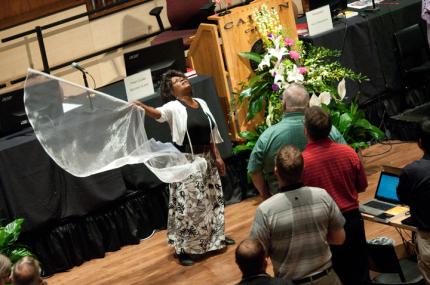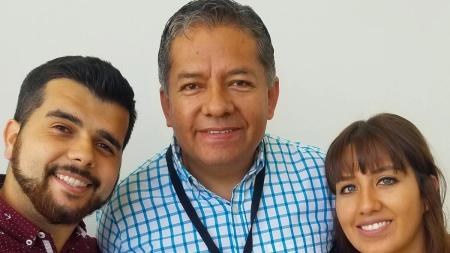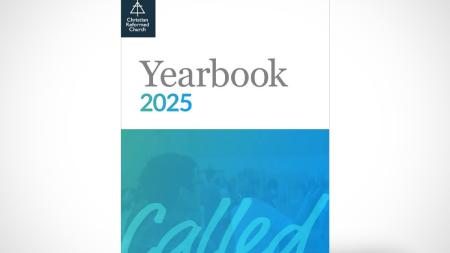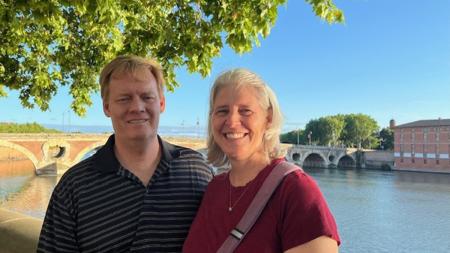Denomination Calls for Year of Prayer

For the next year, leaders and members of the Christian Reformed Church in North America are being called to turn to God in prayer and to ask the Lord for help as the church faces a range of struggles leading up to Synod 2022.
This call came from the Council of Delegates of the CRCNA, who in May declared June 2021 - June 2022 to be a year of prayer inviting people to listen “to the Spirit and to one another, recognizing that we stand in a challenging moment that invites us to be discipled in postures and practices of prayerful discernment,” say the minutes of the COD meeting.
The goal is that this season of prayer may “refresh biblical practices of prayerful discernment and the postures that are consistent with these practices.” In addition, “the project will reflect the diversity and unity present in the CRCNA.”
People are starting to organize spaces and places as well as formats and programs in response to the COD’s declaration. Hopes are that the desire and discipline to pray, especially during a time of social and church-related disruptions, will take hold and firmly lead the CRCNA into Synod 2022 when, among other things, a discussion of the church’s study report on human sexuality will take place.
“I am encouraged by the denominational prayer program by the COD,” said Jon Hoekema, a leader in this prayer movement and pastor of Horizon Community Church in Downers Grove, Ill.
Hoekema hopes that people will join in prayer across the denomination and that the denomination will be unflagging by keeping its attention on prayer.
“We are very good at planning, and we are very good at study and discussion, but we have a ways to go in learning how to discern God's voice and pray together,” he said. “We say that prayer is important, but we make the assumption that it happens. I'm thankful for the intentionality that the COD is bringing to this.”
Hoekema has helped to organize a monthly prayer gathering that can serve as a template for others to follow — and that gathering will be part of the prayer effort.
“This idea came out of a prayer gathering brought together by Denise Posie while she was working for the denomination before retiring [to serve at Calvin Theological Seminary],” he said.
“I gathered a team to organize and plan it. We started last November and met every other month. This coming September we will be meeting for prayer monthly,” said Hoekema.
And this monthly session will be part of the COD’s push for prayer.
“For our prayer times I plan a prayer guide for a passage following the rhythm of the Lord's Prayer — reverence, response, requests, and readiness. We always start with praise and then submission because it reminds us who God is and who we are. Then we bring our requests before God.”
In its request the COD asks for prayer that arises from concerns about the troubled world we live in. In addition, we are asked to take a hard look at ourselves — at our motives, at our lack of forgiveness, at our unwillingness to see beyond ourselves and our concerns.
“This project recognizes that we live in a highly polarized, politicized context and that we have all been infected by its toxins. The project invites us to be open to having blind spots exposed (selfish ambition or vain conceit), cultural idolatries named, corporate repentance practiced,” wrote the COD.
The COD is also asking every classis in the denomination to participate in this effort by setting aside an hour for worship and prayer. This will take place either at a regularly scheduled classis meeting or a specially scheduled meeting, using resources provided by the denomination and/or local resources.
Syd Hielema, director of the CRC’s Connections Project, will also be one of the leaders that help guide people into significant times of prayer.
Given the weight of wisdom called for at Synod 2022, he explained, the COD has been asked to call for a year of prayer during which “we pray with others from across the denomination, in large groups and small groups, in person and on Zoom, in a variety of settings.”
It is important, Hielema added, to put this denominational call for prayer into perspective, noting that Synod 2022 will be the first synod in three years, and that during this time the church has experienced unprecedented stresses.
For example, we must consider how congregational life will be different after the COVID-19 pandemic. “In what ways,” Hielema asked, “will the temporary adjustments made during the pandemic lead to permanent changes?”
And beyond that is the human sexuality report, which has been several years in the making.
“How might we engage the emotionally charged human sexuality report with grace and truth, listening to one another with respect and holy curiosity?” he asked.
Yet another issue: addressing racism in the church and in our own hearts.
“What do we need to learn about racial reconciliation? The non-Caucasian membership of the CRCNA is growing the fastest. What is the Lord calling us to through these statistics?” Hielema added.
In addition, three executive positions in the CRCNA need to be filled by or soon after Synod 2022. “Who is the Lord calling to these positions?” Hielema asked.
As a part of this prayer project, all delegates to Synod 2022 will be called to three times of prayer before synod convenes.
Looking ahead to Synod 2022, Hielema has been praying with the guidance of excerpts from the prayer of Jehoshaphat in 2 Chronicles 20:12: “Our God . . . we have no power to face this vast army that is attacking us. We do not know what to do, but our eyes are on you.”
And as the Lord responded to that prayer with a miracle in defeating an invading army in a way that no one could have predicted, “so I too pray with hope,” said Hielema.
Colin Watson, Sr., executive director of the CRCNA,
encourages leaders and church members to take up the opportunity to
build connections between one another through denomination-wide
prayer.
"Our prayer reflects our yearning for fellowship with God and our
desire to worship God fully – it's a desire for relational oneness
with him. Over the past year, and currently, there are countless
issues and forces that are working to create wedges of separation
between us and God, and between us as God's people," said Watson.
"It is our desire to rekindle our first love – to recapture the spirit
of Jesus prayer in John 17.May we love God, and love each other so
deeply, that the world will know that Jesus is Lord. And may we spend
at least this coming year moving closer to God's desire for us."


